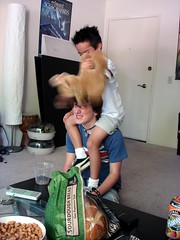 |
| (Photo credit: videocrab) |
- Individualize your children – recognize their different personality styles and talents. I've written a lot about personality styles, so I won't go into that here but a huge part of reconciling conflicts is recognizing that each child has their own unique personality and hence different things are important to each. Recognizing strengths and maximizing them is a great way to honor the individuality of each child. Keep in mind that it takes a lot of positive to make up for even one negative so keep positive in the forefront. Practical ways that you can do this are by spending one-on-one time regularly with each child and letting him choose what you do together. Point out the areas in his life where you see him excelling as well as the things you see him struggling with.
- Model how to compromise and solve conflicts--Children learn from us how to handle difficult situations. Talk with her about the challenges you face everyday and and how you worked out the problem. Make sure you aren't blaming others or pointing out other's faults, but rather are honestly sharing how you reconcile differences. As you encounter conflicts in your children's lives remind them of good skills for working problems out. Point out that just as you had to compromise, or consider options or look at things a different perspective, so she can do this as well in her interactions.
- Encourage positive and constructive communication--Teach your child that conflicts are normal but certain ways of interacting are not. Blaming, threatening, name-calling, teasing, physically fighting etc are all negative ways to interact and never solve problems. Consequences should be in place for any negative behavior. Instead, teach your child to identify the problem and then consider the possibilities for resolution. Does one child want to play with a toy and the other not want to share? Ask them to list all the possible solutions to the is problem; play together with the toy, set a timer for each child to play individually with the toy, both take a break and play with something else, etc. Then rather than you as the parent making the executive decision have them work together to decide which choice is best. Teach them ways to decide such as; vote, roll a dice and high number wins, rock, paper scissors. The point here is that as parents we aren't just solving their problems, we are teaching them how to solve much bigger conflicts later in life. Does this take more time than putting the toy up and not letting anyone play with it? Yes! But in the long run you are saving time because children are learning to solve their own problems rather than rely on you every time.
- Frame conflict as an opportunity rather than a problem--Some personality styles are more sensitive to conflict than others. Some would rather avoid it and others prefer to face it head on. Teach your children that conflict is normal but how you look at it is important. Instead of a problem, consider it an opportunity to become closer to each other, to establish rules of play or family time, to understand each other's point of view better. In order to do this, we need to encourage dialogue rather than separation. As a parent, I would sometime separate my daughters in their own rooms "until you can get along." Unfortunately nothing is happening in the separate rooms to encourage this. Instead consider having the children in conflict sit beside each other and talk until they can solve their differences.
- Recognize your own feelings surrounding conflict and interpersonal differences. Just as our children come with their own personalities, we as parents have not only our own temperament but our own history with sibling rivalry. Were you the youngest child in your family who felt continually picked on by the oldest? Were you the middle child who felt you had to create conflict to get noticed? Our own history may flavor how we react to conflict in our children. Make sure that you are operating out of a calm space and teaching good skills rather than taking sides or replaying your own history.
Sibling rivalry can be seen as a problem to be squashed or an opportunity to build character, cooperation, understanding, compromising skills and closeness if we give our children the support and encouragement to help them work it out. As parents we can model and teach the best way to solve interpersonal conflicts, leaving our children with skills they will use all their lives.







No comments:
Post a Comment